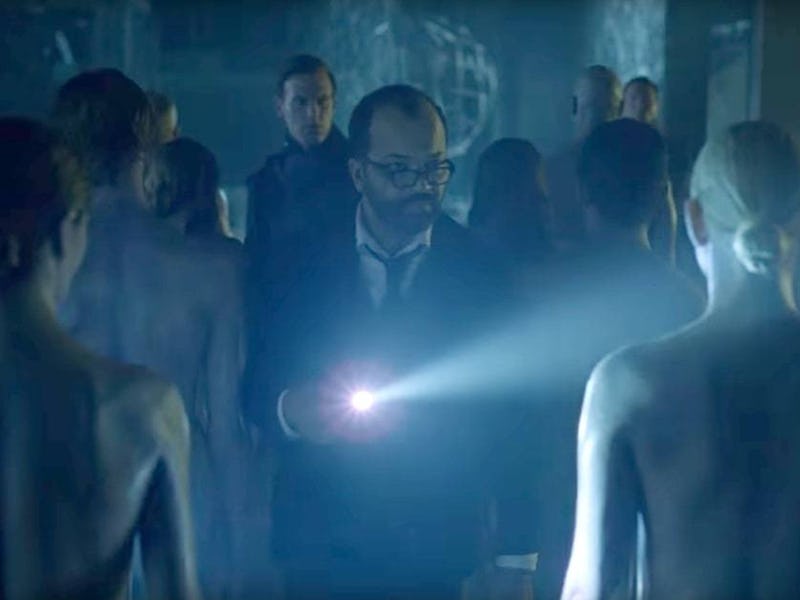HBO Helps America Prep for the Automation Revolution
'Westworld' forces its audience to answer some uncomfortable questions about their core functions.

HBO’s new show Westworld encourages a specific type of suspicion. Unlike Quantico or Homeland, it’s not about a witch hunt, yet watching it requires participating in one. When, in the pilot episode, the security guard responsible for maintaining the peace, armors up to face automatons incapable of harming living creatures, it’s natural to wonder if his concern emerges from savvy suspicion or clever programming. If there’s no risk, why the over-preparation? If there’s a risk, why doesn’t the park just 3D-print a goon squad? Jeopardizing human employees would be inefficient and we know that the park’s sharply dressed demigods, a cadre of opportunistic executives eyeing their humane pater apparatus with suspicion, wouldn’t go for that.
So, that dude is a robot, right?
The creeping logic of robotization is as central to the Westworld viewing experience as the wide open landscapes of flesh. The show may be mass entertainment deep fried in the pop philosophy (and dipped in HBO’s capsicum sexuality), but it is also educational. By teaching its inevitably massive viewership to ask “Who’s a robot?” the show can also teach viewers to pursue a more critical line of inquiry: Who could be a robot?” With McKinsey & Co. claiming that an “automation bomb” will lead to the computerization of almost half of U.S. work activities in the coming years, those questions aren’t just semantically different.
An Oxford University study released in 2014 estimated the probability that the job of a security guard would be largely automated within the next two decades. Using a Gaussian process classifier, they put the number at 84 percent. According to the bureau of labor statistics, there are roughly 1,100,000 security guards working in America. Collectively, these workers make somewhere near $30 billion annually, money that is spent on homes, foods, and children’s clothes. That all means that whether or not Scrubb is a robot isn’t just the stuff of fan theories; if he’s is a robot working in a park in a capitalist country — as the Westworld heavily implies he is — he represents job loss and potentially privation as well.
Technological unemployment has been a concern for unions and workers’ advocates since the introduction of the mechanized loom set off the Luddite riots in England. Yet it remains an abstraction for many if not most professionals. There is an egotistical line of thinking that goes, “Surely they could replace him with a machine, but what I do is far too complicated.” Still, complexity is a crummy foxhole. The Oxford researchers claim the chances of personal financial advisors becoming largely automated in the next 20 years is 58 percent. Plenty of the jobs dominated by those within HBO’s comfy demographic could be rendered obsolete by artificial intelligence.
Yes, white collar workers have previously come through technological revolutions no worse for wear. But the “Fourth Industrial Revolution” promises to do more than eliminate menial work and accelerate the flow of new products toward global markets. There’s the distinct chance that, by allowing capital to possess rather than manipulate labor, automation could sever the connection between progress and employment. Will robots allow ingenious entrepreneurs to create more jobs? Likely so, but maybe not at scale.
The choice between computerized and human labor is, from an employer’s perspective, a choice between up-front and long-term cost. Small businesses may start with human employees, but growth will make automation a real opportunity. And making the decision to head that direction requires taking reformulating one’s relationship with labor in a way that might prove insidious.
Westworld does an excellent job of highlighting this fact by underscoring with fake blood the specific thing that makes robots better workers than humans: You can do anything to them. Dolores, the machine tasked by the show runners with building an emotional arc, has been raped and murdered for 30 years, but she wakes up happy every morning. She resents nothing. She demands only routine maintenance. She is so disposable that it never makes sense to dispose of her.
The robot uprising trope is old hat and won’t take on any Old Testament resonance in the real world until there are drastic improvements in artificial intelligence. According to experts — many of whom view the Turing Test as a flawed way of understanding self-awareness — those are unlikely to occur this century. Robots won’t rise up because they will not suffer. But that doesn’t mean they won’t create the sort of conditions that foment revolt. It’s fair to wonder what an actress would have to have been willing to do to compete for the role of Dolores. Robots can dehumanize indirectly.
Over the course of the next few months, a Westworld fandom will congeal and, because writer and producer Jonathan Nolan isn’t sticking to the source material, conjectures will go viral. The thriving, expanding ecosystem of postulation will resemble the accretion of rumors around Game of Thrones. It also won’t. Westworld replaces death, the core of the Westerosi experience, with understanding. The question isn’t whether or not characters will survive, but whether or not they’ll grasp the role they play in a massive machine. To that extent, fans of the show will be able to play along in a way that followers of the Starks never could. They can ask themselves the same question the character on Westworld have to ask: “Could I be a robot?”
Probably. And if not now, then soon.